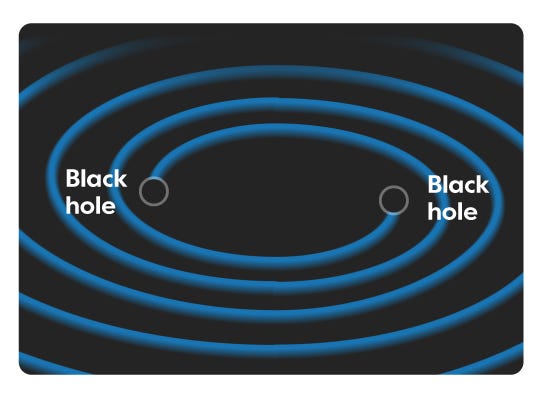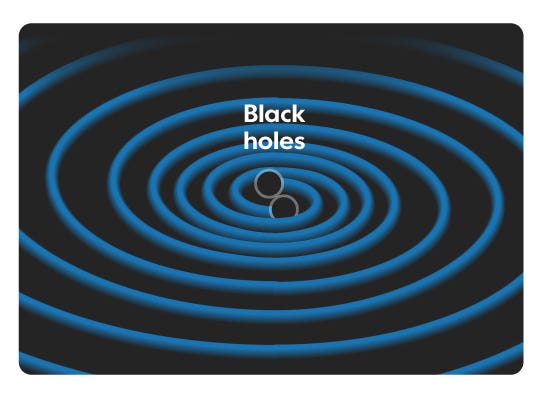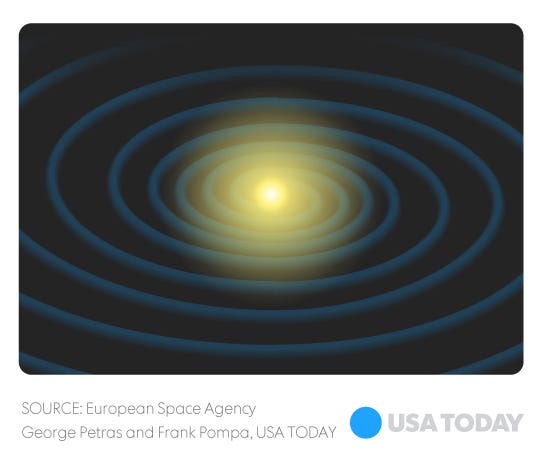- Thread Author
- #1
grandy
Senior Member
- Joined
- Aug 4, 2011
- Messages
- 11,640
http://www.usatoday.com/story/news/2016/02/11/ligo-discovers-gravitational-waves/80226644/
Revolutionary discovery: Scientists find gravitational waves Einstein predicted
Traci Watson, Special to USA TODAY 11:10 a.m. EST February 11, 2016
Revolutionary discovery: Scientists find gravitational waves Einstein predicted
Traci Watson, Special to USA TODAY 11:10 a.m. EST February 11, 2016
In a discovery that promises to revolutionize astronomy, scientists have made the first direct observations of gravitational waves ? bizarre ripples in space-time foreseen by Albert Einstein a century ago.
The find is a triumph for Einstein?s celebrated general theory of relativity, the basis of his 1916 prediction that the fabric of the universe is perturbed by gravitational energy. The find is also a triumph for the mammoth scientific apparatus ? the Laser Interferometer Gravitational-wave Observatory (LIGO) ? that was the first to pick up the stealthy advance of these waves, in this case created by the violent union of two black holes 1.3 billion years ago.
Other scientists hailed the find as the kind of advance that comes along only once or twice in a lifetime. Because gravitational waves carry information about their source, the ability to detect these weird undulations will allow researchers to study distant and elusive features of the universe. Black holes too far way to study using today?s techniques, for example, should become easy scientific prey with the help of gravitational waves.
Study of the universe via gravitational waves ?will be the astronomy of the 21st century,? predicted Arizona State University?s Lawrence Krauss, who is not part of the LIGO team. ?This is a whole new window on the universe.?
As far back as the 1970s, scientists garnered indirect evidence for such waves, spawned by the movements of massive objects in space, such as spinning supernovae or whirling pairs of neutron stars. The $1 billion LIGO directly captured the wave itself, which, if confirmed, would be ?a monumental extra step,? said Cole Miller of the University of Maryland, who is not affiliated with LIGO either.
LIGO?s twin detectors, one in Hanford, Wash., the other in Livingston, La., picked up the wave on Sept. 14, 2015 ? several days before official data collection was scheduled to resume after a five-year renovation of the equipment. Each of LIGO?s outposts consists of an L-shaped tunnel, the arm of each L stretching 2? miles. When a gravitational wave hits, the length of the arms changes ever so slightly. The detectors are sensitive enough to pick up a length change of only one ten-thousandth the diameter of a proton, which is one of the particles making up an atom.
The gravitational waves detected by LIGO came from the final moments before the collision of two black holes somewhere in the Southern Hemisphere. The two had been spiraling closer and closer toward one another for billions of years, spitting out gravitational waves as they approached.
In the last, cataclysmic instant before they crashed together and merged into one, they generated waves with more energy than the entire visible universe. The waves rippled outward at the speed of light, eventually arriving at ? and passing through -- Earth.
Many such cosmic spectacles have been invisible to science until now.
?We?re missing some of the most violent, dynamic and exciting things in the universe,? Miller said, but gravitational waves are ?going to give us a remarkable view into a universe that has largely been denied us.?
Scientists have never gotten a peep at the very edge of a black hole, for instance. But studying gravitational waves, which are born at that edge, will ?allow us to see almost into the heart of a black hole,? Krauss said. The waves will allow researchers to probe ?realms we?ve only thought about, realms of science-fiction movies.?
Researchers had long worried that the first sign of gravitational waves would be ambiguous or fuzzy. Instead ?the data are spectacular,? said Scott Ransom of theNational Radio Astronomy Observatory, adding that the data prompted one of his colleagues to shed tears of happiness.
Assuming the detection is confirmed, Miller says, his reaction is ?unalloyed joy. ? This is fantastic.?
Gravitational waves confirmed
Astrophysicists have announced the discovery of gravitational waves, ripples that travel at the speed of light through the fabric of space-time. A 1916 theory of Albert Einstein?s predicted their existence.

The ripples can be unleashed by movements of massive objects in space, such as a spinning neutron star or a pair of black holes orbiting each other.

Two black holes swinging around each other create gravitational waves as they spiral closer together.

The find is a triumph for Einstein?s celebrated general theory of relativity, the basis of his 1916 prediction that the fabric of the universe is perturbed by gravitational energy. The find is also a triumph for the mammoth scientific apparatus ? the Laser Interferometer Gravitational-wave Observatory (LIGO) ? that was the first to pick up the stealthy advance of these waves, in this case created by the violent union of two black holes 1.3 billion years ago.
Other scientists hailed the find as the kind of advance that comes along only once or twice in a lifetime. Because gravitational waves carry information about their source, the ability to detect these weird undulations will allow researchers to study distant and elusive features of the universe. Black holes too far way to study using today?s techniques, for example, should become easy scientific prey with the help of gravitational waves.
Study of the universe via gravitational waves ?will be the astronomy of the 21st century,? predicted Arizona State University?s Lawrence Krauss, who is not part of the LIGO team. ?This is a whole new window on the universe.?
As far back as the 1970s, scientists garnered indirect evidence for such waves, spawned by the movements of massive objects in space, such as spinning supernovae or whirling pairs of neutron stars. The $1 billion LIGO directly captured the wave itself, which, if confirmed, would be ?a monumental extra step,? said Cole Miller of the University of Maryland, who is not affiliated with LIGO either.
LIGO?s twin detectors, one in Hanford, Wash., the other in Livingston, La., picked up the wave on Sept. 14, 2015 ? several days before official data collection was scheduled to resume after a five-year renovation of the equipment. Each of LIGO?s outposts consists of an L-shaped tunnel, the arm of each L stretching 2? miles. When a gravitational wave hits, the length of the arms changes ever so slightly. The detectors are sensitive enough to pick up a length change of only one ten-thousandth the diameter of a proton, which is one of the particles making up an atom.
The gravitational waves detected by LIGO came from the final moments before the collision of two black holes somewhere in the Southern Hemisphere. The two had been spiraling closer and closer toward one another for billions of years, spitting out gravitational waves as they approached.
In the last, cataclysmic instant before they crashed together and merged into one, they generated waves with more energy than the entire visible universe. The waves rippled outward at the speed of light, eventually arriving at ? and passing through -- Earth.
Many such cosmic spectacles have been invisible to science until now.
?We?re missing some of the most violent, dynamic and exciting things in the universe,? Miller said, but gravitational waves are ?going to give us a remarkable view into a universe that has largely been denied us.?
Scientists have never gotten a peep at the very edge of a black hole, for instance. But studying gravitational waves, which are born at that edge, will ?allow us to see almost into the heart of a black hole,? Krauss said. The waves will allow researchers to probe ?realms we?ve only thought about, realms of science-fiction movies.?
Researchers had long worried that the first sign of gravitational waves would be ambiguous or fuzzy. Instead ?the data are spectacular,? said Scott Ransom of theNational Radio Astronomy Observatory, adding that the data prompted one of his colleagues to shed tears of happiness.
Assuming the detection is confirmed, Miller says, his reaction is ?unalloyed joy. ? This is fantastic.?
Gravitational waves confirmed
Astrophysicists have announced the discovery of gravitational waves, ripples that travel at the speed of light through the fabric of space-time. A 1916 theory of Albert Einstein?s predicted their existence.

The ripples can be unleashed by movements of massive objects in space, such as a spinning neutron star or a pair of black holes orbiting each other.

Two black holes swinging around each other create gravitational waves as they spiral closer together.




